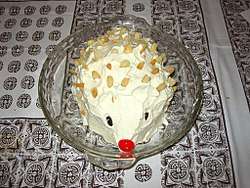Tipsy cake
A tipsy cake is a sweet dessert cake, made originally of "fresh sponge cakes soaked in good sherry and good brandy."[1] The dish as prepared in England would typically have several small cakes stacked together, with the cracks between bristling with almonds. As a variety of the English trifle, tipsy cake is popular in the American South, often served after dinner as a dessert or at Church socials and neighborhood gatherings.
 A tipsy cake shaped like a hedgehog, and decorated with nuts, raisins and a cherry | |
| Type | Cake |
|---|---|
| Main ingredients | Sponge cake, sherry, brandy, sometimes bourbon or Tennessee whiskey |
The tipsy cake originated in the mid-18th century. A recipe for cake or biscuits, alcohol, and custard combined in a trifle bowl came to the American colonies via the British, who settled in the coastal south. Its popularity remained with Southern planters who enjoyed sweet desserts. Tipsy cake was also humorously called Tipsy Parson, because it presumably lured many a Sunday-visiting preacher "off the wagon". The name refers to the amount of alcohol used in the dish's preparation.[2]
One variety of the cake combines stale pound and/or angel food cake, fruit jam, one ounce whiskey, five ounces sherry, and warm vanilla pie filling or custard. All the ingredients save the pie filling are mixed together; then the warm pie filling/custard is poured over the top and the dish chilled. Whipped cream is poured over the top of the dish just before serving.[3]
References
- Party-giving on Every Scale, London. n.d. (1880), p. 16, as "looked on as a second-class sweet" when part of a wedding breakfast, but recommended.
- Stradley, Linda (May 24, 2015). "Trifle History, Tipsy Hedgehog, Whats Cooking America". Whatscookingamerica.net. Retrieved 29 January 2017.
- "Tipsy Cake Recipe". Cooksrecipes.com. Retrieved 29 January 2017.
Further reading
- Huntsman, A.; Myers, J. (2011). Desserts from the Famous Loveless Cafe: Simple Southern Pies, Puddings, Cakes, and Cobblers from Nashville's Landmark Restaurant. Artisan Books. p. 149. ISBN 978-1-57965-434-4. Retrieved January 29, 2017.